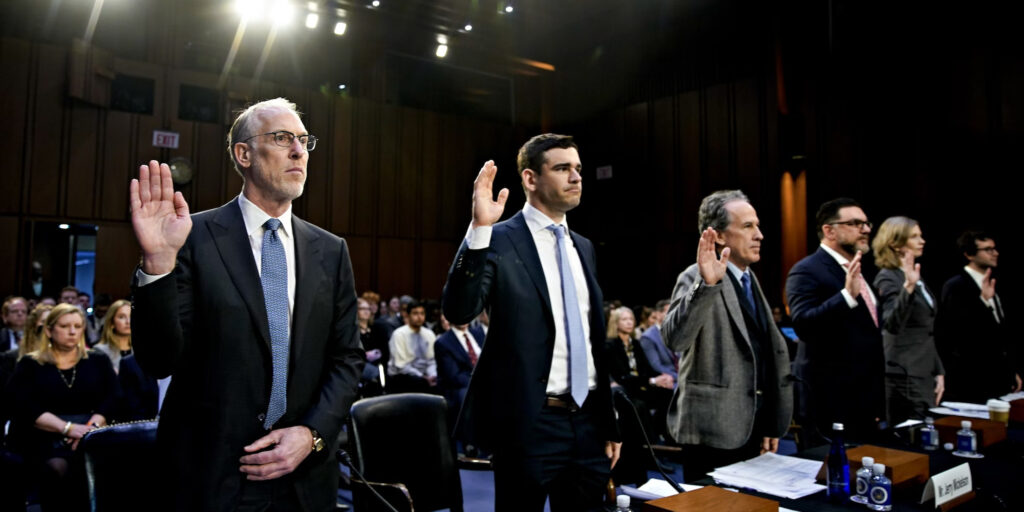Big Tech to US Congress: Listen to Taylor Swift and Go after Ticketmaster, Not Us
ANGLO AMERICA, 30 Jan 2023
Ryan Grim | The Intercept - TRANSCEND Media Service

From left to right: Joe Berchtold, Jack Groetzinger, Jerry Mickelson, Sal Nuzzo, Kathleen Bradish, and Clyde Lawrence are sworn in to a Senate Judiciary Committee hearing in Washington, D.C., on Jan. 24, 2023. Photo: Al Drago/Bloomberg via Getty Images
25 Jan 2023 – Silicon Valley dodged a hail of congressional bullets through the last several months of 2022. A suite of antitrust legislation threatened to puncture the industry’s monopolistic business model, but the bills never left the upper chamber.
The legislative package represented the most advanced legislative threat to Big Tech since the industry’s birth. Several bills passed through the House of Representatives and others, sponsored by Sen. Amy Klobuchar, D-Minn., cleared the Senate Judiciary Committee.
Following the November elections, which saw Republicans take over the House, Big Tech’s Washington lobby kicked it into higher gear, working to make sure the threat didn’t materialize in the next Congress.
And they found an unlikely hero: Taylor Swift.
In mid-November, Swifties looking to secure tickets to the singer’s upcoming Eras Tour were foiled en masse by monopolistic incompetence of Live Nation, the parent company of Ticketmaster, which melted down amid the surge in demand. It was a poignant demonstration of monopolism run amok — and of what a mistake it had been for the Obama administration to have greenlighted the Ticketmaster-Live Nation merger that effectively ended competition in the ticketing industry.
Politicians dutifully denounced the decrepit company, and Big Tech spied an opening to deflect and distract.
The next day, the lobbying firm NetChoice, which represents the Big Tech conglomerates in Washington, urged Congress and antitrust policymakers to focus their attention on Ticketmaster.
“Congress and progressives like Amy Klobuchar are spending all this time going after tech leaders including Meta, Google, Amazon and Apple, which are far from monopolies,” NetChoice policy counsel Jennifer Huddleston said in an email November 16 to press and Washington power brokers. “Instead, the government should use existing laws and resources to protect consumers and investigate Ticketmaster’s anti-competitive practices in the concert marketplace.”
For its first hearing of the year on Tuesday, January 24, the Senate Judiciary Committee chose to target Live Nation, with Chair Dick Durbin, D-Ill., in a panel titled, “That’s the Ticket: Promoting Competition and Protecting Consumers in Live Entertainment.”
The hearing included testimony from Joe Berchtold, president and chief financial officer of Live Nation Entertainment; Jack Groetzinger, CEO of SeatGeek; Jerry Mickelson, CEO and president of Jam Productions; and musician Clyde Lawrence of the band Lawrence; and advocates on both sides of the issue.
Right now the The Senate Judiciary Committee is holding a hearing on Ticketmaster, and whether or not the company has monopoly power, controlling too much of the ticket industry and driving up prices.
Senator Amy Klobuchar kicked it off with a reference to Taylor Swift. 🧵 pic.twitter.com/FjhBR5JCJe
— More Perfect Union (@MorePerfectUS) January 24, 2023
The choice of hearing sends a signal regarding congressional priorities, and Swifties and Big Tech alike celebrated the coal-raking of Ticketmaster. Indeed, there are few companies less popular for better reasons than Ticketmaster, which controls some 80 percent of the concert venue market.
Another real time fact check on Live Nation-Ticketmaster's spin. Their claim that they only control about 50-60% of the ticketing business is bogus. pic.twitter.com/tJURM4gcWc
— American Economic Liberties Project (@econliberties) January 24, 2023
Big Tech’s targeting of Ticketmaster is far from altruistic, however. On Tuesday, Carl Szabo, vice president and general counsel of NetChoice, laid out the industry’s interest in the case. The Ticketmaster example, Szabo said in a statement, shows that, actually, there’s no need for all the work Congress and federal antitrust regulators like FTC Chair Lina Khan are doing to rethink competition policy in order to encompass industries like Big Tech. Ticketmaster is such a flagrant example of monopolistic practices, yet regulators have done nothing to break them up. If Washington won’t even bother with the low-hanging fruit, how can it chop down trees in Silicon Valley?
"There's literally not been a single time in our career where we've played at a Live Nation venue where we had any opportunity to not have Live Nation be the promoter or Ticketmaster be the ticketing company." – @lawrencetheband
This is what a monopoly looks like. pic.twitter.com/5RnVgBn8Wb
— American Economic Liberties Project (@econliberties) January 24, 2023
The industry also implied that reforming antitrust laws might make it harder to go after Ticketmaster, though that’s not the case. Szabo’s statement said:
We have seen Ticketmaster pressuring artists and venues to use their system, withholding thousands of tickets from sale to the general public, and helping ticket speculators circumvent anti-bot protections. At the same time, consumers can’t get access to tickets, and prices have continued to skyrocket—a clear example of consumer harm.
It’s obvious that this presents an antitrust enforcement action under the consumer welfare standard—the current legal framework in the U.S. for bringing antitrust cases. This already-existing legal criteria is meant to deter the government from targeting businesses based on political leanings. Under the consumer welfare standard’s 3-pronged test, the government must show a company’s market power, abuse of that power and proof that the company’s actions resulted in consumer harm. Clearly, LiveNation’s practices would fit under this framework.
Yet the Biden administration and progressives in Congress have been trying to change these effective guidelines to serve their own political goals. It’s mind-boggling that Biden’s Department of Justice and Federal Trade Commission have wasted taxpayer resources and pursued legally-questionable antitrust enforcement actions, while simultaneously failing to address this clear case of consumer harm and anti-competitive practice in the ticket sales market.
While we’re glad to see the U.S. Senate Judiciary Committee is taking these anticompetitive practices seriously, antitrust law would not need to be changed to bring an enforcement action against LiveNation/Ticketmaster for this fiasco.
The argument did not appear to persuade the Department of Justice, which announced on Tuesday it plans to sue Google — again — for monopolizing the online ad market.
In testimony prepared for the Judiciary Committee, Live Nation’s president argued that Ticketmaster wasn’t all that bad. “Ticketmaster comes under a lot of criticism, and I look forward to addressing that today,” he said in prepared remarks. “But I can say with great confidence that technologically Ticketmaster is a much better ticketing system today than it was in 2010.”
Aside from Big Tech, railroad workers and antitrust advocates have been pushing Congress to take a stand against a merger between two of the few remaining railroad companies that have yet to be consolidated, Canadian Pacific and Kansas City Southern. Durbin, the chair of the Judiciary Committee and Senate majority whip, has publicly opposed that merger.
___________________________________________
 Ryan Grim – ryan.grim@theintercept.com
Ryan Grim – ryan.grim@theintercept.com
Tags: Amazon, Anglo America, Big tech, Communication, Corruption, Facebook, Google, Official Lies and Narratives, Social media, US Congress, USA
DISCLAIMER: The statements, views and opinions expressed in pieces republished here are solely those of the authors and do not necessarily represent those of TMS. In accordance with title 17 U.S.C. section 107, this material is distributed without profit to those who have expressed a prior interest in receiving the included information for research and educational purposes. TMS has no affiliation whatsoever with the originator of this article nor is TMS endorsed or sponsored by the originator. “GO TO ORIGINAL” links are provided as a convenience to our readers and allow for verification of authenticity. However, as originating pages are often updated by their originating host sites, the versions posted may not match the versions our readers view when clicking the “GO TO ORIGINAL” links. This site contains copyrighted material the use of which has not always been specifically authorized by the copyright owner. We are making such material available in our efforts to advance understanding of environmental, political, human rights, economic, democracy, scientific, and social justice issues, etc. We believe this constitutes a ‘fair use’ of any such copyrighted material as provided for in section 107 of the US Copyright Law. In accordance with Title 17 U.S.C. Section 107, the material on this site is distributed without profit to those who have expressed a prior interest in receiving the included information for research and educational purposes. For more information go to: http://www.law.cornell.edu/uscode/17/107.shtml. If you wish to use copyrighted material from this site for purposes of your own that go beyond ‘fair use’, you must obtain permission from the copyright owner.